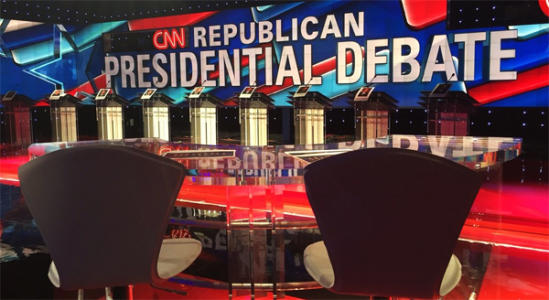 While watching the last Republican presidential debate, a question came to mind: will there ever be a democratic debate exclusively dedicated to national security and terrorism?
While watching the last Republican presidential debate, a question came to mind: will there ever be a democratic debate exclusively dedicated to national security and terrorism?
The debate in Las Vegas on December 15th relayed a clear message from the Republican candidates to the American people: their commitment to the national security of the United States. As expected, the candidates presented different approaches, but there was a striking common denominator: the determination to ensure the security of the country and to destroy Islamic terrorism.
Recent events around the world are changing the way people think. The terrorist attacks in Paris and San Bernardino, illegal immigration and the relocation of thousands of refugees from the Middle East to the United States have aroused fear in the country, especially due to ISIS. A survey by CBS News recently revealed that terrorism is now the number one priority amongst Americans.
The concern is well justified and it is not a surprise that Republican presidential candidates devoted their fifth debate entirely to the threat of Islamic terrorism and national security.
The Republican debate in Las Vegas was a successful event for the GOP, with 18 million people watching it. It also had an audience much higher than the second Democratic debate, surpassing it with almost 10 million viewers. Actually, it was the third-largest presidential primary debate in history. So far, the liberal media has ignored these differences.
For decades, biased moderators had unfairly influenced presidential debates between Republican and Democratic candidates. The debate hosted by CNN in Las Vegas was yet another example.
When it comes to presidential debates, CNN modus operandi has become familiar and predictable, just like other left-wing media. These moderators typically ask two-way questions full of hidden connotations of guiltiness directed towards the Republican candidates.
During the debate, CNN moderator, Wolf Blitzer, deliberately created the impression that Republican candidates are willing to kill civilians and relatives of terrorists for no reason. This approach is in contrast with what is asked or inferred at Democratic debates. Democratic candidates are barely asked anything concerning Islamic terrorism and the way its horrific acts impact American priorities and concerns. CNN, like other liberal media, hypocritically avoid these issues or cover them up superficially. Their decisions to avoid the subject serve one purpose: to protect the Democratic Party and their candidates.
The differences between the candidates of the two parties cannot be more obvious. While Republicans discuss facts related to national security and ways to eliminate terrorism, Democrats focus on climate change and gun control. Lets remember, for Hillary Clinton, the number one U.S. enemy is the National Rifle Association, not terrorism. For Bernie Sanders, the most serious threat facing the country is climate change, not terrorism.
Has someone ever asked the Democratic candidates what they think about Iran having nuclear weapons after their leaders publicly shout “Death to America”? Did someone accuse a Democratic candidate of trying to kill terrorist relatives or civilians for no reason? And what about questions regarding the persecution and genocide of Christians and other religious groups in the Middle East? These issues are barely addressed or simply ignored during Democratic presidential debates.
Hillary Clinton got the green light despite her cover-up of the terrorist attack on the American Consulate in Benghazi. Her email scandal as Secretary of State was also very much ignored, despite putting the country’s national security at risk. The killing of civilians due to airstrikes in Iraq and Syria during the Obama administration seems to be a forbidden topic. Likewise, the recent bombing of a “Doctors Without Borders” hospital in Afghanistan where at least 19 people were killed was not even mentioned.
Can you imagine the kind of questions Republican presidential candidates would have to face if these events had happened during a Republican administration?
Independent individuals with no political affiliation or relationship to any political party should moderate debates; only then can the American people witness a fair and well-intentioned debate. Only then can citizens learn about the real positions, pasts, and political visions of each presidential candidate.
Most importantly, the presidential debates should always be honest and impartial. Unfortunately, this is not how the left operates during electoral campaigns, in the United States or any other country in the world.
To be continued after the third Democratic debate….
